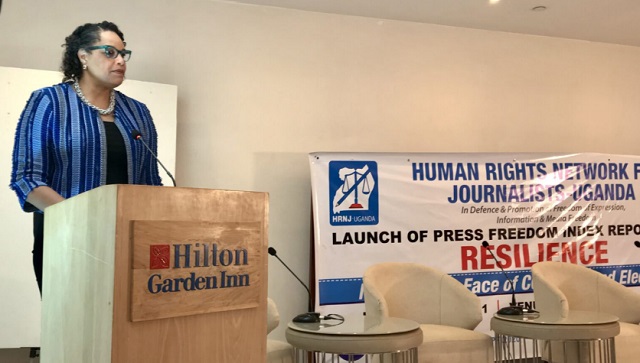
Uganda marks it amid brutal attacks on journalists
ANALYSIS | THE INDEPENDENT | On April 28 Teddy Nakaliga and Amon Kayanja, both reporters for separate TV stations hit the road in Kayunga Village, Wakiso District, to cover a demonstration by residents protesting a two-week power blackout.
As Nakaliga narrated later, she was interviewing the protesters and recording vox pops when, without warning, military men pounced on her and whipped her thoroughly. Her back and cheeks were left black and blue. Nakaliga is pregnant. But her tormentors cared less.
Kayanja meanwhile has a penchant for wearing sharp suits even when going to cover a riot. He likes to look his best on TV. So when the soldiers pounced on him, he was totally flummoxed that they dared tear-up the double-breast jacket he was wearing. And yes, they also threw his TV camera onto the tarmac and trampled on it.
The next day, April 29, as members of the public were still excitedly debating the increasing attacks on journalists by security agents more gloomy news came in: Robert Kagolo, a top news manager at the government-owned Uganda Broadcasting Corporation (UBC) had been shot dead in the night.
Details of Kagolo’s shooting were still scanty by the time we went to press but it appears he was shot dead by a Local Defence Unit (LDU) guard stationed at his brother’s house in Bugembejembe village, Wakiso District. Kagolo had requested police to deploy security at the house because he was allegedly in fear of his life after his brother was kidnapped and murdered by unknown people a week earlier. Kagolo was returning from burying his brother when he too was killed.
Initial reports suggested that Kagolo’s killing was possibly unrelated to his work as a journalist. But his killing was quickly picked on and added to the stories of how security forces are brutalising journalists. Earlier, on April 22, another TV reporter, Enock Matovu, was pounced on and badly battered by soldiers in Mityana. His injuries were so severe he had to be admitted Mityana Hospital.
The attacks continued after the elections and prompted the heads of media stations on April 16 to meet with the top brass of the Uganda Army and plead for the safety of journalist. They agreed on a Memorandum of Understanding that the security forces would end brutalising journalists.
The army side was led by UPDF Gen. David Muhoozi and the media team led by National Association of Broadcasters chairperson, Kin Kariisa, who is the CEO of Next Media Group which runs a number of electronic media outlets.
The MOU agreed read in part that: “Both parties shall develop a training plan to sensitise and train journalists on how operations should be covered and for the UPDF, on how journalists and media practitioners should be treated and handled during operations”.
The media honchos even played a friendly soccer game with their erstwhile tormenters. But it appears the rapprochement was to be short-lived.

Stories of attacks on journalists have added significance because they were occurring just days to commemoration of World Press Freedom Day on May 03 and on the back of scathing report by Journalists Without Frontiers that rapped the Ugandan government for its clampdown on the media in 2020 in the run-up to the Jan. 14, 2021 general elections.
Freedom of Press ranking
In their report, RSF, kept Uganda’s ranking on the Freedom of Press Index steady at number 125 out of 180 countries. Ethiopia was at number 101, Kenya at 102, Tanzania at 124, Burundi at 147, and Rwanda trailed at 157.
The report noted that acts of intimidation and violence against reporters are an almost daily occurrence in Uganda. One press freedom watchdog, Human Rights Network for Journalists (HRNJ), said it documented over 100 attacks from November to the election.
“The security services, which are the leading press freedom violators, often target journalists and detain them arbitrarily,” they said.
They added that President Yoweri Museveni, who has been in power for the past 35 years, tolerates no criticism and often uses hate speech in his references to the media, as in a 2018 press conference when he called journalists “parasites”.
“His reelection in early 2021 was preceded by an especially repressive campaign in which RSF logged more than 40 attacks on journalists and media in the final weeks,” the report said.
The report pointed out that the authorities censored media reports by cutting off the Internet and practised disinformation, describing some journalists as CIA agents.
“The persecution of journalists has been reinforced since June 2017 by the creation of a special team of state security officers and IT experts to scan posts on Facebook and other social networks for criticism of the government,” the report said.
Since 2018, use of social media is subject to a daily tax, the first of its kind in Africa, one that further undermines journalists and media outlets. Facebook has even suspended certain accounts held by officials and government sympathisers, accusing them of “manipulating the public debate”, the report added.
“It is not uncommon for the authorities to intervene directly to block the broadcasting of TV reports,” the report said, “In 2019 the police raided three commercial radio stations to cut short interviews with the opposition leader.”
 The Independent Uganda: You get the Truth we Pay the Price
The Independent Uganda: You get the Truth we Pay the Price



